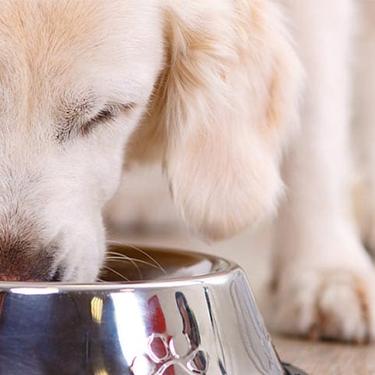
-
Find the right food for your pet
Take this quiz to see which food may be the best for your furry friend.
Find the right food for your pet
Take this quiz to see which food may be the best for your furry friend.
Featured products
 Adult 7+ Perfect Digestion Chicken, Whole Oats & Brown Rice Recipe Dog Food
Adult 7+ Perfect Digestion Chicken, Whole Oats & Brown Rice Recipe Dog FoodScience Diet's breakthrough nutrition supports ultimate digestive well-being & healthy microbiome for dogs age 7+
Shop Now Small & Mini Savory Stew with Chicken & Vegetables Dog Food
Small & Mini Savory Stew with Chicken & Vegetables Dog FoodA delicious complement to the nutrition of Science Diet Small & Mini 7+ dog food
Shop Now Adult Healthy Cuisine Roasted Chicken, Carrots & Spinach Stew Dog Food
Adult Healthy Cuisine Roasted Chicken, Carrots & Spinach Stew Dog FoodDelicious roasted chicken paired with tender vegetables in a succulent stew
Shop NowFeatured products
 Adult 7+ Tender Tuna Dinner Cat Food
Adult 7+ Tender Tuna Dinner Cat FoodWith delicious chunks in a decadent gravy
Shop Now Adult 7+ Senior Vitality Chicken & Vegetable Stew Cat Food
Adult 7+ Senior Vitality Chicken & Vegetable Stew Cat FoodImproves Everyday Ability to Get Up & Go
Shop Now Adult Savory Entrée Can Variety Pack Cat Food
Adult Savory Entrée Can Variety Pack Cat FoodPrecisely balanced nutrition with the delicious taste of savory minced chicken to help fuel the energy needs of cats during the prime of their life
Shop Now -
Dog
- Dog Tips & Articles
-
Health Category
- Weight
- Food & Environmental Sensitivities
- Urinary
- Digestive
- Joint
- Kidney
-
Life Stage
- Puppy Nutrition
- Adult Nutrition
- Senior Nutrition
Cat
- Cat Tips & Articles
-
Health Category
- Weight
- Skin & Food Sensitivities
- Urinary
- Digestive
- Kidney
-
Life Stage
- Kitten Nutrition
- Adult Nutrition
Featured articles
 Why Are Dogs and Cats So Cute?
Why Are Dogs and Cats So Cute?If waggy puppy dog tails and furry kitten yawns make you swoon, you're not alone. Why are cats so cute? And, dogs too! Let's find out!
Read More Does My Pet Hate Me?
Does My Pet Hate Me?Learn tips for bonding with your pet if you've ever thought, 'My dog doesn't like me, or 'Why do I have a standoffish cat?'
Read More Do Dogs and Cats have Belly Buttons?
Do Dogs and Cats have Belly Buttons?Learn whether cats & dogs have belly buttons like humans, what the function is, and if there are any health concerns associated with it.
Read More -


While corneal ulcers in dogs are more common among certain breeds, all dogs are at risk of developing them. Read on to learn about the diagnosis and treatment of a dog with a corneal ulcer, plus get tips for prevention.
What Is a Corneal Ulcer?
The cornea is the clear outermost layer of the front of the eye that helps contain the eye's jelly-like filling. The cornea is made up of tissues that are tough enough to withstand light bumps and minor injuries, but delicate enough to let light pass through unimpeded for terrific eyesight.
The cornea is covered by a thin layer of cells called the corneal epithelium. When this surface layer is breached and cells here are damaged or dislodged, it results in an injury called a corneal ulcer.
Causes of Corneal Ulcers in Dogs
The superficial layer of the cornea can be damaged as a result of the following:
- Chemical burns: From shampoo, skin medicine, ear cleaner, etc.
- Scratches: From accidental self-trauma, roughhousing or a fight
- Blunt trauma: From a car accident or running into an object, for example
- Penetrating injuries: From sticks, sharp toys, claws or teeth
- Rubbing: From foreign bodies under the eyelid, dry eye, lid problems or an itchy eye
Corneal ulcers in dogs can also develop when the corneal epithelium becomes diseased or infected. Minor injuries can lead to complications if they get infected. Primary infections of an otherwise healthy eye can also happen with some aggressive viruses and fungi.
Dogs can also develop a corneal ulcer for an unknown reason. In these cases, the condition is called indolent ulceration or spontaneous chronic corneal epithelial defects. This mostly occurs in dogs older than 6 years old.

Signs of Corneal Ulcers in Dogs
The most common signs of corneal ulcers in dogs include:
- Blinking excessively or shutting the affected eye
- Significant tearing or discharge from the eye
- Redness and/or swelling of the tissues surrounding the eye
- Poor appetite
- Hiding
- Pawing or rubbing the eye, among other abnormal behaviors
Corneal ulcers are fairly easy to diagnose by a veterinarian. Some dogs will have obvious changes to the surface of the eye. Most, however, will need a simple diagnostic test involving fluorescein dye to stain the cornea, thereby making it easier to see where there is damage.
Risk Factors
Corneal ulcers can affect dogs of any breed at any life stage. However, young dogs are generally more likely to suffer a trauma that causes a corneal ulcer, since they tend to get themselves into more trouble.
Dogs born with bulging eyes, dry eyes or an eyelid shape or structure that makes them prone to dry eyes or rubbing injuries — as seen in bloodhounds and Shar-Peis — predisposes them to corneal ulcers. Indolent ulcers are most often seen in golden retrievers and boxers.
Most genetic conditions that predispose a dog to corneal ulcers come to the surface in middle-aged or senior dogs.


Tasty Tips
Are Corneal Ulcers in Dogs Serious?
While corneal ulcers shouldn't cause panic, they are notoriously painful and it's important to get your dog to the veterinarian right away if you suspect they have one. Untreated corneal ulcers can lead to vision loss and, in rare cases, may require eye removal.
Treating a Dog With a Corneal Ulcer
The usual treatment for a dog with a corneal ulcer includes topical antibiotics and pain relievers (eye drops) multiple times a day. Sometimes oral and even injectable medications are also prescribed or administered. Dogs with corneal ulcers that are properly treated almost always maintain their vision.
Surgery may be necessary if there's extensive damage to the cornea. Depending on the severity of the corneal ulcer, your vet may recommend seeing a veterinary eye specialist called an ophthalmologist.
Home Care for a Dog With a Corneal Ulcer
Administering all medicines as prescribed may be daunting, but it's absolutely crucial you follow your vet's instructions. Keeping your dog from rubbing their affected eye is also important, so have your dog wear a high-quality dog cone and restrict their exercise.
Treating a corneal ulcer takes time, effort and lots of patience. Ultimately, corneal ulcers in dogs have a high treatment success rate and are often preventable in dogs who are predisposed to eye problems.
Finally, know that good nutrition is fundamental for your dog's general eye health. Dogs need balanced and complete dog food to aid proper eye development as puppies and to get adequate eye support as adults and into their senior years.


Dr. Patty Khuly is an award-winning veterinarian known for her independent thinking, her spirited pet advocacy, her passion for the veterinary profession, and her famously irreverent pet health writing.
Dr. K is an honors graduate of both Wellesley College and the University of Pennsylvania School of Veterinary Medicine. She received her MBA at The Wharton School of Business as part of the prestigious VMD/MBA dual-degree program. She now owns Sunset Animal Clinic, a veterinary practice in Miami, Florida.
Related products
Related articles

Proper nutrition for your pregnant or nursing dog is vital to her and her puppy's health. Learn what you should do provide her with the proper nutrients.

Learn the the dangers of feeding your dog chocolate, which types are most dangerous, and what to do if you discover that they have consumed chocolate.

Learn how today's wet dog food blends have gotten a face lift, and how you'll provide your dog the nutrition he needs in the form he loves.

Learn about choosing the right dog food to help ensure your adult dog will receive the correct balance of nutrition.

Put your dog on a diet without them knowing
Our low calorie formula helps you control your dog's weight. It's packed with high-quality protein for building lean muscles, and made with purposeful ingredients for a flavorful, nutritious meal. Clinically proven antioxidants, Vitamin C+E, help promote a healthy immune system.
Put your dog on a diet without them knowing
Our low calorie formula helps you control your dog's weight. It's packed with high-quality protein for building lean muscles, and made with purposeful ingredients for a flavorful, nutritious meal. Clinically proven antioxidants, Vitamin C+E, help promote a healthy immune system.

